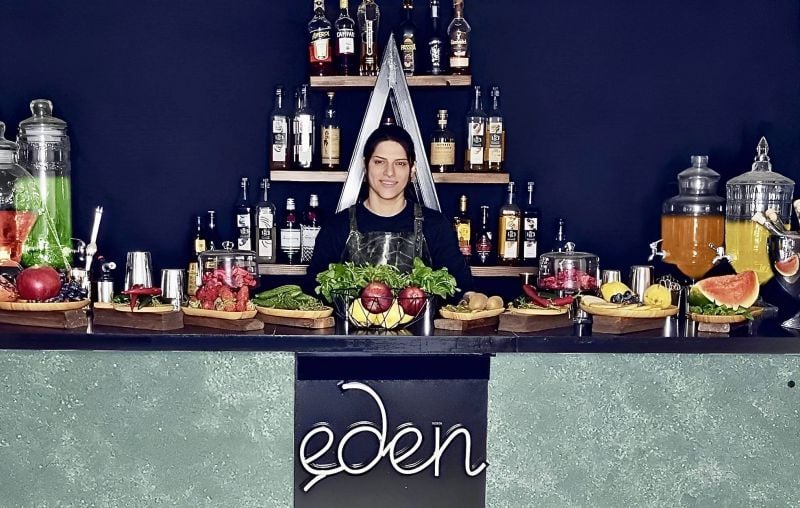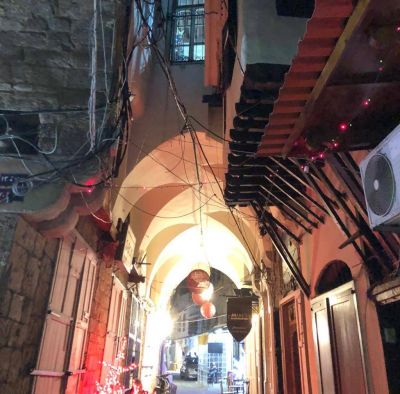
An "Eden" mobile bar in Beirut. (Courtesy of: Eden mobile bars)
Cynthia Haddad is thrilled. After several trips back and forth, her new workspace is finally ready just in time for the start of the summer party season: a wooden bar made by a carpenter in Gemmayzeh, a neighborhood not far from downtown Beirut.
The almost three-meter-long, U-shaped bar can be assembled and disassembled within minutes. Its triangle-shaped shelf and cupboards can store dozens of bottles and cocktail ingredients, while its front can be customized, thanks to an interchangeable panel system, with four themes. The central panel, irremovable and black, features a neon sign that reads: “Eden.”
Haddad, in her early 30s, is preparing to relaunch the mobile bar company started by her brother, death metal musician Jean-Pierre Haddad, who died in an accident a year ago.
“My brother started this business in early 2017. Business was good for two years,” says Cynthia. “Then the crisis started, followed by COVID-19. JP traveled abroad for work and then had the accident,” says Cynthia. “Today, I want to make it a solid brand, at my own pace,” she adds.
COVID-19 shuts down nightlife
Haddad is confident about the future of Eden because mobile bars are popular among Lebanese partygoers who still have the means to go out drinking despite the crisis.
“It’s been 10 or 15 years since the concept was introduced in the country, mainly in weddings and private parties where mobile bars started to be seen alongside caterers,” says Naji Morkos, co-manager of HODEMA, a tourism and hospitality consulting firm.
Magali Gemayel, managing director of bar catering company The Tipplers, agrees. “There were only a handful of players when we launched our company. Today, there are more than 30.” Her company operates two dozen mobile bars with different themes.
Launched in April 2016, The Tipplers has since joined the club of well-established players in the market, like Bar-Chitect, Butler Bottles, Liquid Engineers and Cin Cin. The company took part in more than 400 events in 2019, mainly spread over popular party seasons and anticipates somewhat of a comeback this year. “More than the crisis, it is the lockdowns related to COVID-19 that impacted our business, with only about 50 events in 2020,” says Gemayel.
Starting with a small team of four people, the company now employs 30 full-timers, not counting around 20 subcontractors. It offers no fewer than 25 different bar designs, including welcome drink stations for big events. “There is something for every occasion, from weddings and private parties to corporate events and trade shows,” says Gemayel. This willingness to diversify can be found among a majority of players.
Rates are generally set per customer, starting at $10 dollars and going up depending on the drinks, how many bartenders are working and whether the mobile bar is insured.
Still room for new players
The increasing number of mobile bar companies on the Lebanese market reflects a real craze for this concept among partygoers, as well as hotel and catering professionals, people in the field say.
“It has developed in recent years under the impulse of a growing demand and the interest of bartenders,” says Morkos from HODEMA. He points to the advantages of this model for professionals. “The basic investment is lower than for a traditional bar and the operating costs are minimal.”
“Above all,” Morkos adds, “there won’t be a build-up of stocks,” as supplies are bought and sold on demand, or event by event.
The customers’ interest is elsewhere. “In a country where alcohol consumption is mostly done in a festive context, the mobile bar has gradually become attractive in itself,” says Gemayel.
“It gives an added value to the party, and in a country like Lebanon, it is one of the best-selling pitches,” says Morkos.
Is the market already saturated? There aren’t reliable statistics, but Morkos, for example, believes that there is still room for new players.
“It is a very volatile sector, essentially based on services and very sensitive to new trends and therefore to new faces,” Morkos says.
Gemayel has a more nuanced opinion. “Today, we are numerous, but there is work for everyone. I think there is still room, especially for entry-level services.”
Haddad prefers to focus on launching her business. “There is still some time. The Lebanese will not stop partying tomorrow,” she says.
This article was originally published in French in L’Orient-Le Jour. Translation by Joelle El Khoury.

